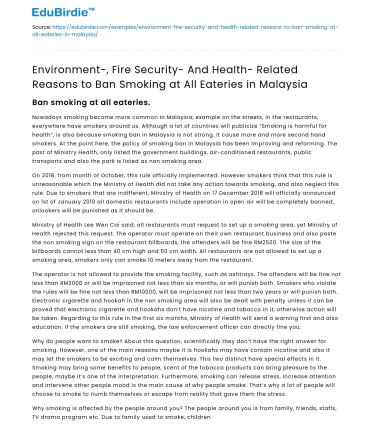Introduction
The debate surrounding public smoking bans, particularly in eateries, is a contentious one, with health implications at its core. In Malaysia, the proposal to ban smoking in all dining establishments aims to create a healthier environment for both patrons and employees. The World Health Organization (WHO) has long advocated for smoke-free public spaces, emphasizing the detrimental health effects of secondhand smoke. According to the WHO, exposure to secondhand smoke causes approximately 1.2 million premature deaths annually on a global scale. In Malaysia, where smoking prevalence remains high, implementing such a ban could significantly reduce health risks associated with tobacco smoke. This essay explores the rationale behind banning smoking in all eateries in Malaysia, examining the health benefits, addressing potential economic concerns, and considering public opinion and compliance challenges. Ultimately, this discussion underscores the necessity of such regulations to safeguard public health.
Health Benefits of a Smoking Ban
The primary justification for banning smoking in all Malaysian eateries is the substantial health benefits it offers. Tobacco smoke contains over 7,000 chemicals, including at least 70 known carcinogens, as reported by the Centers for Disease Control and Prevention (CDC). Non-smokers exposed to secondhand smoke in dining establishments are at increased risk of developing respiratory illnesses, cardiovascular diseases, and lung cancer. A comprehensive smoking ban would mitigate these risks, contributing to a healthier population. A study published in the journal "Tobacco Control" revealed that implementing smoke-free policies in public places leads to a significant reduction in hospital admissions for heart attacks and respiratory conditions. Malaysia, with its rising healthcare costs and increasing burden of non-communicable diseases, would greatly benefit from such preventative measures.
Save your time!
We can take care of your essay
- Proper editing and formatting
- Free revision, title page, and bibliography
- Flexible prices and money-back guarantee
Moreover, the implementation of a smoking ban aligns with Malaysia's commitment to international health standards. As a signatory to the WHO Framework Convention on Tobacco Control (FCTC), Malaysia is obligated to protect its citizens from the harms of tobacco smoke exposure. The FCTC advocates for comprehensive smoking bans in public places, workplaces, and public transport, emphasizing the protection of vulnerable groups such as children, pregnant women, and the elderly. By enforcing a smoking ban in eateries, Malaysia would not only fulfill its international commitments but also demonstrate leadership in tobacco control efforts.
Economic Considerations and Counter-Arguments
Opponents of the smoking ban often raise concerns about potential economic repercussions, particularly for small businesses and the hospitality industry. They argue that prohibiting smoking in eateries could deter a segment of customers who smoke, leading to reduced patronage and financial losses. However, evidence from countries that have implemented similar bans suggests otherwise. For instance, a study conducted by the American Economic Journal found that smoke-free laws had no negative impact on restaurant and bar revenues in the United States. In fact, many establishments reported an increase in business due to attracting health-conscious customers and families seeking smoke-free environments.
Furthermore, the economic benefits of a healthier population should not be overlooked. By reducing smoking-related illnesses, the healthcare system could save substantial costs associated with treating diseases caused by tobacco smoke exposure. According to the Malaysian Ministry of Health, the annual economic burden of smoking-related diseases amounts to RM 7 billion. A smoking ban in eateries could alleviate this burden, redirecting resources towards more pressing healthcare needs. Addressing these counter-arguments underscores the importance of prioritizing public health over short-term economic concerns.
Public Opinion and Compliance Challenges
Public opinion plays a crucial role in the successful implementation of smoking bans in eateries. Surveys conducted in Malaysia indicate a growing awareness of the health risks associated with secondhand smoke and a general support for smoke-free environments. A study by the Institute for Public Health revealed that over 70% of Malaysians support smoking bans in public places, including eateries. This widespread support provides a solid foundation for policymakers to enact and enforce such regulations effectively.
However, challenges related to compliance and enforcement remain. Ensuring that both businesses and patrons adhere to the smoking ban requires robust monitoring and penalty mechanisms. Lessons can be drawn from countries like Ireland and Australia, where stringent enforcement measures and public awareness campaigns have contributed to high compliance rates. In Malaysia, collaboration between government agencies, local authorities, and civil society organizations is essential to foster a culture of compliance and awareness regarding the benefits of smoke-free dining environments.
Conclusion
In conclusion, the proposal to ban smoking in all eateries in Malaysia is a vital step towards safeguarding public health and aligning with international health standards. The health benefits of such a ban, including reduced exposure to harmful tobacco smoke and decreased incidence of smoking-related diseases, outweigh potential economic concerns. While challenges related to compliance and enforcement exist, the growing public support for smoke-free environments provides a strong mandate for action. By implementing a comprehensive smoking ban in dining establishments, Malaysia can protect its citizens from the harms of secondhand smoke, promote a healthier population, and fulfill its international obligations under the WHO Framework Convention on Tobacco Control. Ultimately, prioritizing public health through such measures will contribute to a more sustainable and thriving society.






 Stuck on your essay?
Stuck on your essay?

